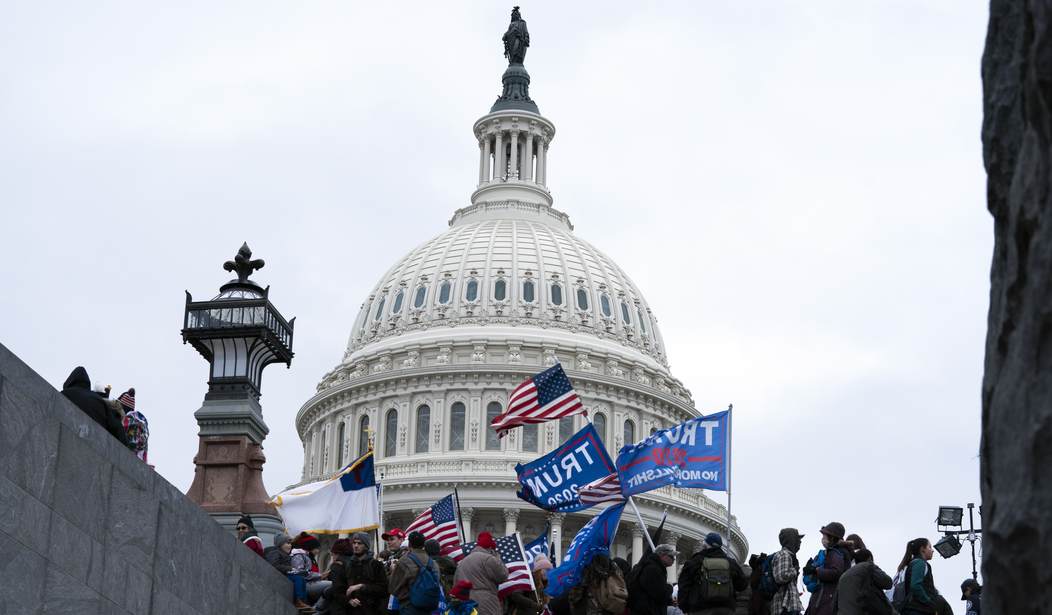While much of the court watching attention on Friday is turned on the following:
- The Southern District of Florida, where former President Donald Trump's legal team and Special Counsel Jack Smith's team are conferencing with Judge Aileen Cannon to determine when the classified documents case against the former president will be set for trial
- Fulton County, Georgia, where attorneys for the state and for the defendants in the racketeering case against Trump and others are presenting their closing arguments regarding the potential removal of District Attorney Fani Willis (and her lead prosecutor, Nathan Wade) from the case due to a conflict of interest
- The Supreme Court, which could be handing down a decision regarding the Colorado-14th Amendment ballot challenge case against Trump...
...the D.C. Circuit Court of Appeals issued a ruling that could have major implications for a number of J6 defendants.
A federal appeals court panel ruled Friday that Jan. 6 defendants who obstructed Congress’ work had their sentences improperly lengthened by judges who determined that they had interfered with the “administration of justice.”
Why/how is this a big deal? Because it could force the recalculation of a number of the sentences that have been entered against defendants in cases related to January 6th.
The decision could force district court judges in Washington, D.C. to recalculate, and perhaps reduce, the sentences for a slew of Jan. 6 rioters convicted of felony obstruction for their roles in the attack on the Capitol that threatened the transfer of power three years ago.
HUGE decision out of DC Circuit this morning saying the proceedings before Congress on Jan. 6 did not involve the "administration of justice" as that phrase is used in the Sentencing Guidelines.
— Shipwreckedcrew (@shipwreckedcrew) March 1, 2024
This will be moot if the SCOTUS throws out the 1512 count altogether in the Fischer.
The case in question involved Larry Brock, who was sentenced to two years in prison following a conviction for obstructing congressional proceedings. His sentence was enhanced by the District Court judge, who found that his actions also interfered with the "administration of justice." (For those who take note of these sorts of things, the District Court judge was a Bush appointee; the three-judge panel that rendered the decision consisted of two Obama appointees and a Clinton appointee.)
The crux of Friday's ruling (which may be viewed in its entirety below) is that the "administration of justice," as used in the statute regarding sentencing enhancement, does not extend to include Congress' counting and certification of Electoral College votes. What this means is that any defendants whose sentences were enhanced under the same provision as Brock's now may have their sentences reduced.
The Department of Justice is reportedly weighing its options regarding an appeal of the ruling to the Supreme Court.
UPDATE: DOJ says it is considering its appeal options after this ruling, which could affect *hundreds* of Jan. 6 sentences. https://t.co/jahHvJTXIz
— Kyle Cheney (@kyledcheney) March 1, 2024
As Shipwreckedcrew points out in his tweet above, an even larger question looms regarding the overall application of the obstruction law to charge multiple defendants with felonies. The case of Fischer v. United States is set to be argued before the Supreme Court in April and will determine: "Whether the U.S. Court of Appeals for the District of Columbia Circuit erred in construing 18 U.S.C. § 1512(c), which prohibits obstruction of congressional inquiries and investigations, to include acts unrelated to investigations and evidence."
Either way, Friday's decision undoubtedly comes as welcome news to multiple J6 defendants.
Brock by Susie Moore on Scribd















Join the conversation as a VIP Member